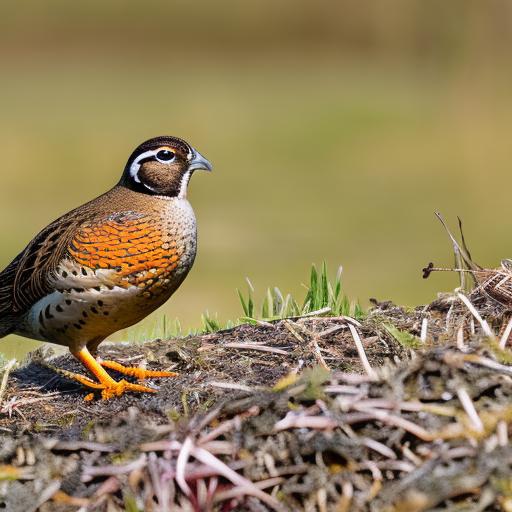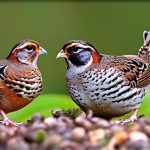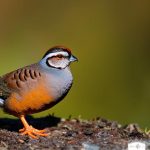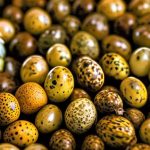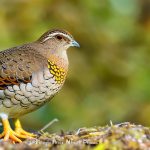When it comes to choosing the right quail breed for outdoor keeping, there are several factors to consider. First and foremost, it’s important to choose a breed that is well-suited to your specific climate and environment. Some quail breeds are more cold-hardy, while others are better suited to warmer climates. Additionally, you’ll want to consider the size of the birds and the space you have available for them. Some breeds are larger and require more space, while others are smaller and can thrive in smaller enclosures.
One popular quail breed for outdoor keeping is the Coturnix quail, also known as the Japanese quail. This breed is known for its hardiness and adaptability, making it well-suited to outdoor environments. Coturnix quail are also prolific layers, making them a great choice for those interested in raising quail for eggs. Another popular breed is the Bobwhite quail, which is native to North America. Bobwhite quail are known for their distinctive call and are often sought after for hunting purposes. They are also well-suited to outdoor environments and can thrive in a variety of climates. Ultimately, the right quail breed for outdoor keeping will depend on your specific needs and environment, so be sure to do your research and choose a breed that is well-suited to your unique situation.
When it comes to choosing the right quail breed for outdoor keeping, it’s important to consider factors such as climate, space requirements, and intended use (e.g. eggs or hunting). Coturnix quail and Bobwhite quail are two popular breeds that are well-suited to outdoor environments, but there are many other breeds to consider as well. Be sure to do your research and choose a breed that is well-suited to your specific needs and environment.
Key Takeaways
- Choose a quail breed that is well-suited for outdoor keeping, such as the Coturnix or Bobwhite, based on your climate and space availability.
- Create a secure enclosure for your quail, using wire mesh and buried fencing to prevent predators from accessing the birds.
- Provide adequate shelter from the elements, such as a well-ventilated coop with a solid roof and protection from extreme temperatures.
- Implement proper feeding and watering practices, including a balanced diet and clean, fresh water to promote quail health and egg production.
- Monitor quail health closely, practice good hygiene, and seek veterinary care when necessary to prevent and manage diseases. Understand and manage quail behavior and social dynamics to ensure a harmonious flock and proper egg collection and incubation.
Creating a Safe and Secure Quail Enclosure
Creating a safe and secure quail enclosure is essential for the health and well-being of your birds. When designing your enclosure, it’s important to consider factors such as predator protection, ventilation, and space requirements. The enclosure should be constructed of sturdy materials that can withstand the elements and keep predators out. Additionally, it’s important to provide adequate ventilation to prevent moisture buildup and ensure good air quality for the birds.
In terms of space requirements, each quail will need at least 1 square foot of space in the enclosure to thrive. However, more space is always better, so be sure to provide as much space as possible within your available area. It’s also important to provide plenty of hiding spots and places for the quail to roost, as this will help reduce stress and aggression within the flock. Finally, be sure to provide a secure door or gate that can be locked at night to prevent predators from gaining access to the enclosure.
When creating a safe and secure quail enclosure, it’s important to consider factors such as predator protection, ventilation, and space requirements. The enclosure should be constructed of sturdy materials and provide adequate ventilation to ensure the health and well-being of the birds. Additionally, be sure to provide plenty of space, hiding spots, and roosting areas for the quail, as well as a secure door or gate to prevent predators from gaining access.
Providing Adequate Shelter and Protection from the Elements
In addition to a secure enclosure, it’s important to provide adequate shelter and protection from the elements for your outdoor quail. This can include providing a covered area within the enclosure where the birds can seek shelter from rain, wind, and extreme temperatures. Additionally, it’s important to provide protection from direct sunlight, as quail can easily overheat in hot weather.
One option for providing shelter is to use a simple structure such as a small shed or lean-to within the enclosure. This can provide a place for the birds to seek shelter and roost, as well as protection from the elements. Another option is to provide natural shelter such as bushes or trees within the enclosure, which can also provide hiding spots and protection from the elements. Ultimately, providing adequate shelter and protection from the elements is essential for the health and well-being of your outdoor quail.
When providing shelter and protection from the elements for your outdoor quail, it’s important to consider factors such as rain, wind, extreme temperatures, and direct sunlight. Providing a covered area within the enclosure or natural shelter such as bushes or trees can help protect the birds from the elements and ensure their health and well-being.
Implementing Proper Feeding and Watering Practices
Proper feeding and watering practices are essential for maintaining the health and productivity of your outdoor quail. When it comes to feeding, it’s important to provide a balanced diet that meets the nutritional needs of the birds. This can include commercial quail feed as well as supplemental treats such as fruits, vegetables, and mealworms. Additionally, be sure to provide access to grit or small stones, which quail need in order to properly digest their food.
In terms of watering, it’s important to provide clean, fresh water at all times. Quail can be particularly sensitive to dirty water, so be sure to clean and refill their waterers regularly. Additionally, it’s important to provide water in a way that prevents spills and contamination, as wet bedding can lead to health problems for the birds. Ultimately, implementing proper feeding and watering practices is essential for maintaining the health and productivity of your outdoor quail.
Proper feeding and watering practices are essential for maintaining the health and productivity of your outdoor quail. This includes providing a balanced diet that meets their nutritional needs, as well as clean, fresh water at all times. Additionally, be sure to provide access to grit or small stones for proper digestion, and take steps to prevent spills and contamination in their water supply.
Managing Quail Health and Disease Prevention
Managing quail health and disease prevention is essential for maintaining a healthy flock of outdoor quail. This includes regular health checks to monitor for signs of illness or injury, as well as taking steps to prevent common diseases and parasites. One important aspect of managing quail health is providing a clean environment with good ventilation, as this can help prevent respiratory issues and other health problems.
Additionally, it’s important to practice good biosecurity measures to prevent the introduction of diseases into your flock. This can include quarantining new birds before introducing them to your existing flock, as well as practicing good hygiene when handling the birds or their equipment. Finally, be sure to familiarize yourself with common quail diseases and parasites so that you can recognize the signs and take appropriate action if necessary.
Managing quail health and disease prevention is essential for maintaining a healthy flock of outdoor quail. This includes regular health checks, providing a clean environment with good ventilation, practicing good biosecurity measures, and familiarizing yourself with common diseases and parasites so that you can recognize the signs and take appropriate action if necessary.
Ensuring Proper Egg Collection and Incubation
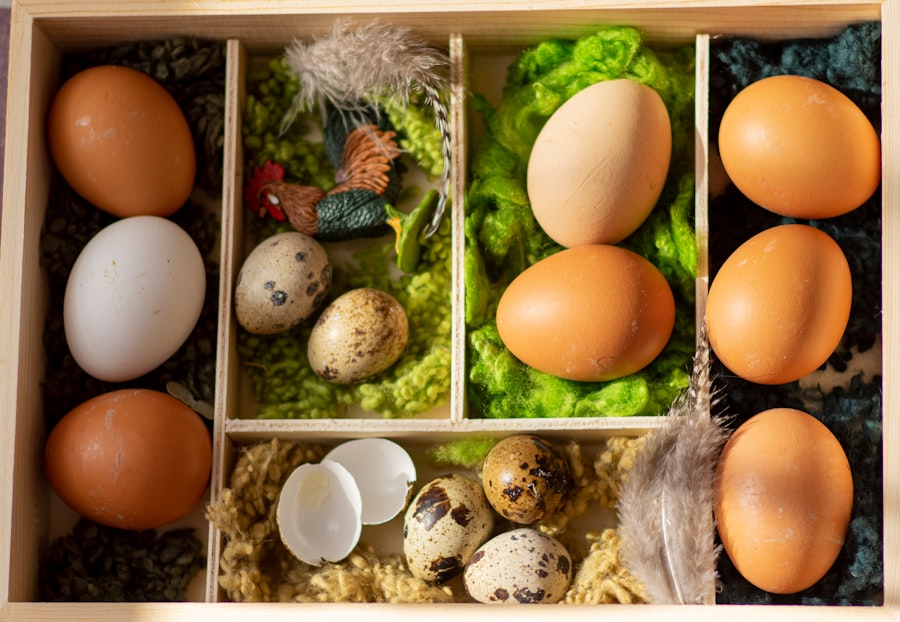
If you’re raising quail for eggs, ensuring proper egg collection and incubation is essential for maintaining a productive flock. When it comes to egg collection, it’s important to collect eggs regularly to prevent them from being damaged or eaten by the birds. Additionally, be sure to handle the eggs carefully to prevent cracking or contamination.
When it comes to incubating quail eggs, it’s important to use a reliable incubator that maintains consistent temperature and humidity levels. Quail eggs typically take around 17-18 days to hatch, so be sure to monitor the incubator closely during this time. Additionally, be sure to handle the eggs carefully when placing them in the incubator and when handling the chicks after they hatch.
Ensuring proper egg collection and incubation is essential for maintaining a productive flock of outdoor quail. This includes collecting eggs regularly and handling them carefully to prevent damage or contamination, as well as using a reliable incubator with consistent temperature and humidity levels for hatching.
Understanding and Managing Quail Behavior and Social Dynamics
Understanding and managing quail behavior and social dynamics is essential for maintaining a harmonious flock of outdoor quail. Quail are social birds that thrive in groups, but they can also be territorial and aggressive at times. It’s important to provide plenty of space within the enclosure so that each bird has room to establish its own territory and avoid conflicts with other birds.
Additionally, be sure to provide plenty of hiding spots and places for the birds to roost, as this can help reduce stress and aggression within the flock. It’s also important to monitor the birds regularly for signs of aggression or injury, as this can indicate underlying issues within the flock. Ultimately, understanding and managing quail behavior and social dynamics is essential for maintaining a healthy and harmonious flock of outdoor quail.
Understanding and managing quail behavior and social dynamics is essential for maintaining a harmonious flock of outdoor quail. This includes providing plenty of space within the enclosure, monitoring the birds regularly for signs of aggression or injury, and providing hiding spots and roosting areas to reduce stress within the flock.
If you’re interested in keeping quail outdoors, you may also want to explore the benefits of having a well-designed chicken coop. Poultry Wizard offers a helpful article on creating a farmhouse chicken coop that provides insights into creating a comfortable and safe environment for your poultry. Check it out here for valuable tips on housing your feathered friends.
FAQs
What are the benefits of keeping quail outdoors?
Keeping quail outdoors allows them to have access to natural sunlight, fresh air, and a more natural environment. It also provides them with more space to roam and forage, which can lead to healthier and happier birds.
What do quail need in their outdoor environment?
Quail need a secure and predator-proof enclosure, access to shade and shelter, clean water, and a balanced diet. They also need a suitable substrate for dust bathing and foraging.
How can I protect my outdoor quail from predators?
To protect outdoor quail from predators, it’s important to use secure fencing, cover the enclosure with netting or wire mesh, and provide a safe and secure shelter for the birds to retreat to at night.
What should I consider when designing an outdoor quail enclosure?
When designing an outdoor quail enclosure, consider the size and space requirements for the number of quail you plan to keep, the type of substrate and vegetation in the enclosure, and the placement of feeders and waterers. It’s also important to consider predator-proofing and providing adequate shelter and shade.
What are some common health concerns for outdoor quail?
Common health concerns for outdoor quail include parasites, respiratory infections, and injuries from predators or environmental hazards. It’s important to monitor the birds regularly for signs of illness and provide them with a clean and safe environment.
How can I provide enrichment for outdoor quail?
To provide enrichment for outdoor quail, consider adding natural elements such as logs, branches, and rocks to the enclosure for the birds to explore and perch on. You can also scatter food for them to forage, and provide dust bathing areas for their natural behaviors.
Meet Walter, the feathered-friend fanatic of Florida! Nestled in the sunshine state, Walter struts through life with his feathered companions, clucking his way to happiness. With a coop that’s fancier than a five-star hotel, he’s the Don Juan of the chicken world. When he’s not teaching his hens to do the cha-cha, you’ll find him in a heated debate with his prized rooster, Sir Clucks-a-Lot. Walter’s poultry passion is no yolk; he’s the sunny-side-up guy you never knew you needed in your flock of friends!

